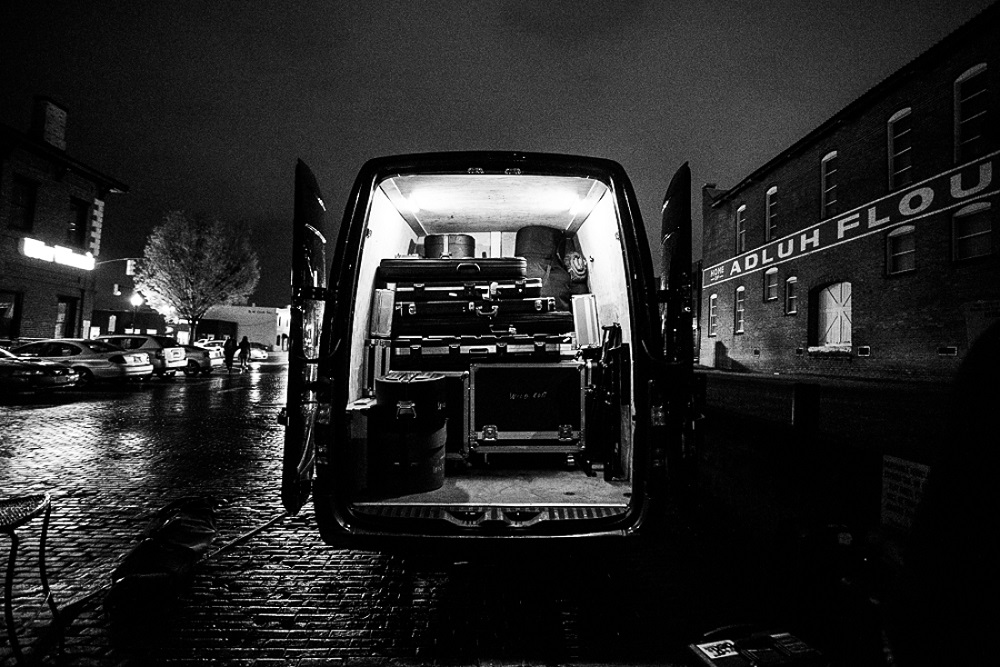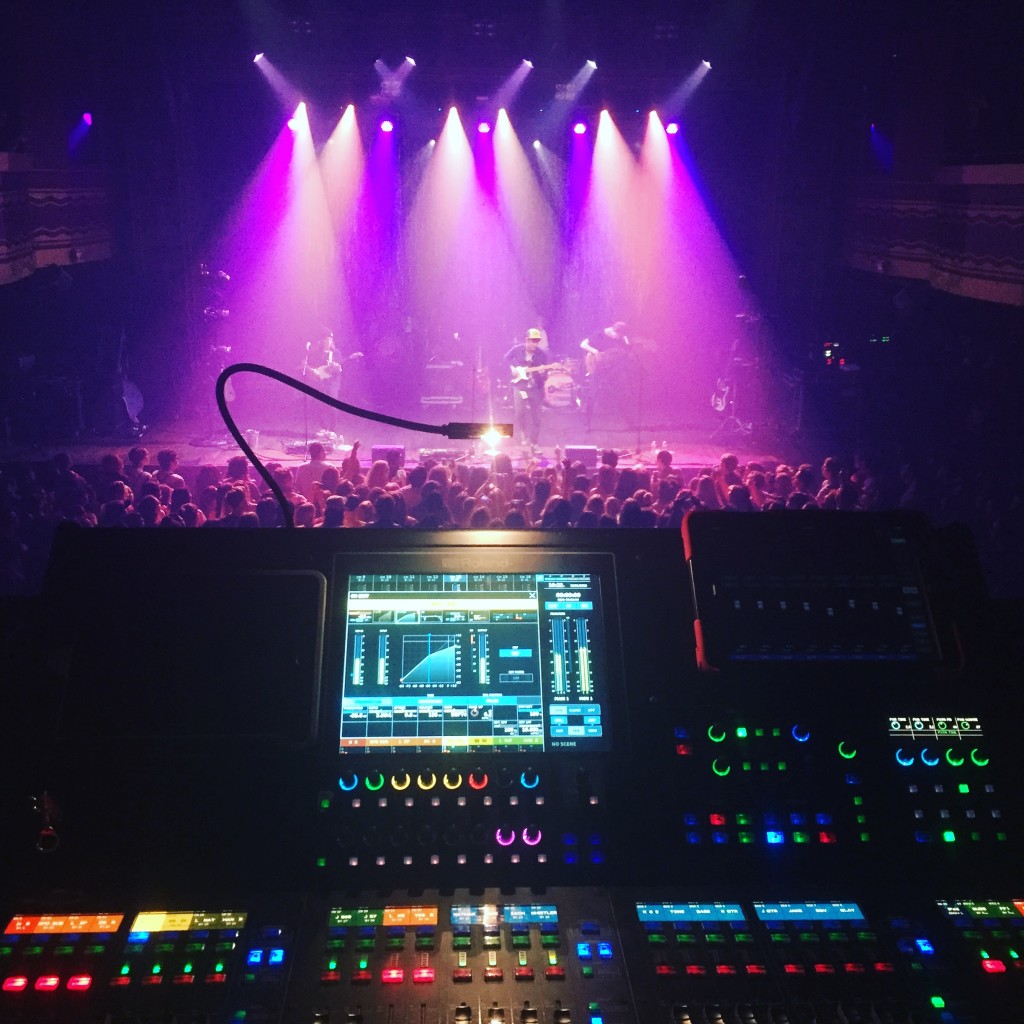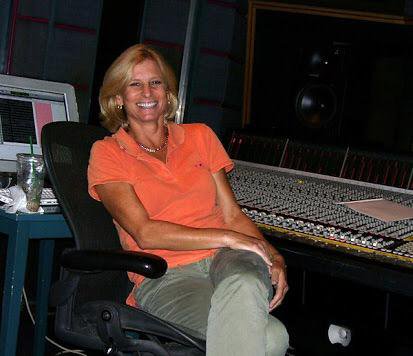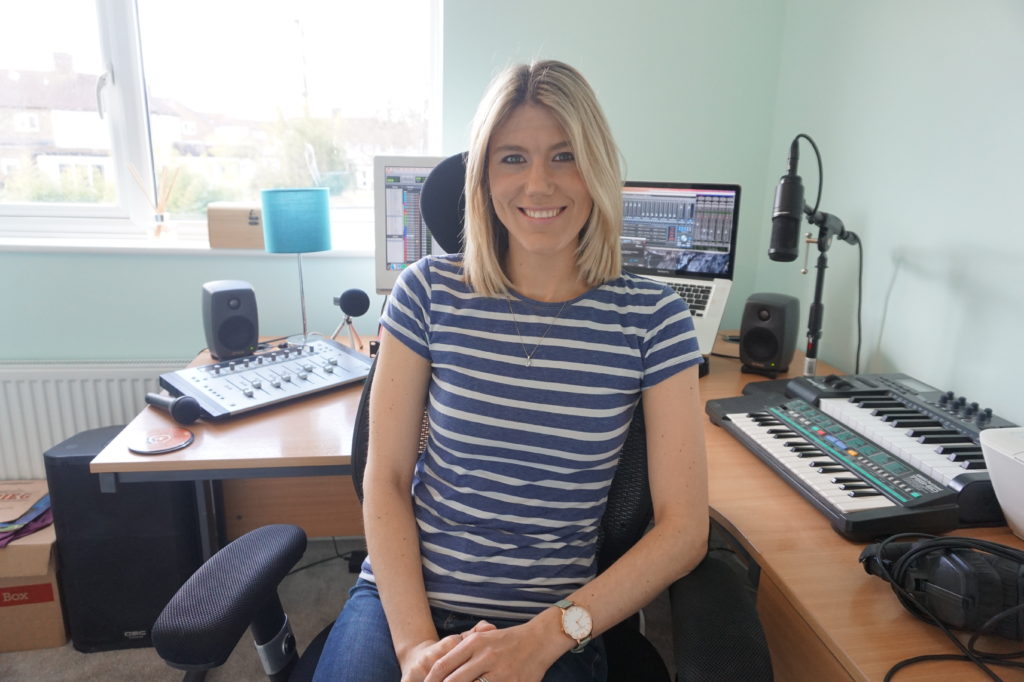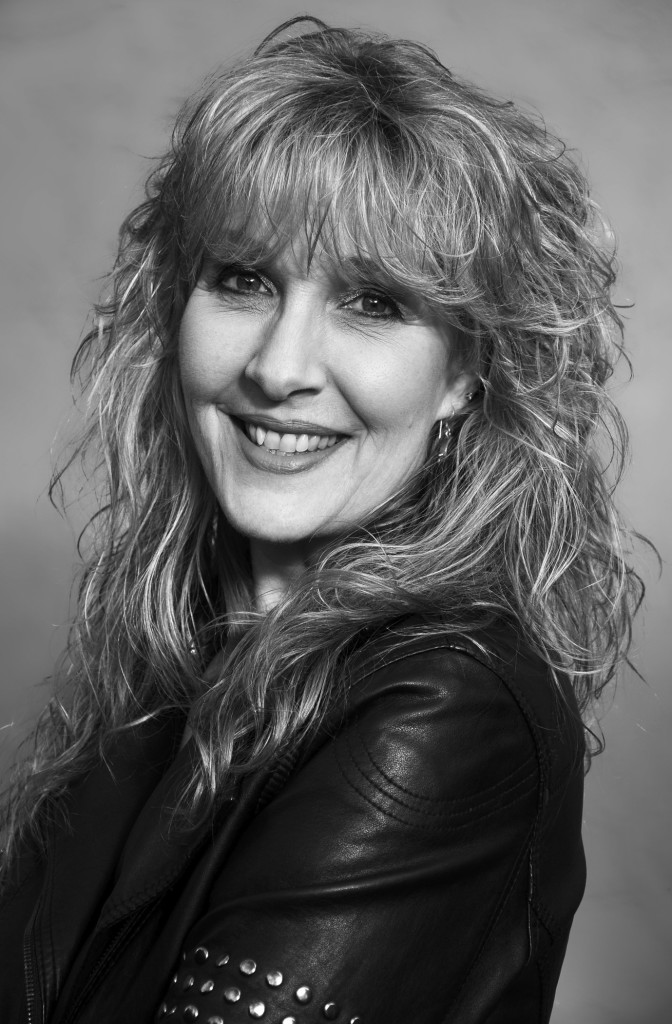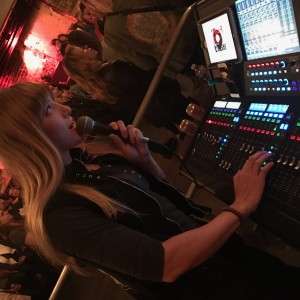 Holly Ann Latcham (Boots) is a touring FOH engineer and Production Manager. She also works as a system tech and monitor engineer for venues such as First Avenue 7th Street Entry, Mill City Nights, the Turf Club, and the Fine Line. She also runs her own company Holly Ann Audio, offering gear rental for small to medium-sized events and tours, FOH and monitor engineers and occasional tour management. She recently has started doing some corporate work with Damron Production Services.
Holly Ann Latcham (Boots) is a touring FOH engineer and Production Manager. She also works as a system tech and monitor engineer for venues such as First Avenue 7th Street Entry, Mill City Nights, the Turf Club, and the Fine Line. She also runs her own company Holly Ann Audio, offering gear rental for small to medium-sized events and tours, FOH and monitor engineers and occasional tour management. She recently has started doing some corporate work with Damron Production Services.
Boots was introduced to the world of live sound at the age of 19. Growing up in a small town of 800 in the heart of Minnesota, she never met anyone that played in a band or even played an instrument other than in the school band. The music she was exposed to was limited to church hymns and her mom’s favorite country artist Shania Twain. That all changed when her brother came home with a Blink 182 album and she was blown away, listening to them every day on the way to school. That would eventually spill over to other artists including Linkin Park and Creed.
As Boots got older, her obsession for music increased and she dreamed of writing her own tunes. That is when she discovered there was an arts high school in the Twin Cities that had a music program “I begged my parents for weeks to at least take me to the open house. I recorded and submitted an application to audition for a spot for my senior year. When I got the letter of acceptance, my teenage-rock-emo-punk self could hardly contain the excitement I felt about being able to finally see more than the cornfields surrounding my tiny town. I packed my bags and cried as my parents convinced me that I had to sell my horse to be able to attend Perpich, and I moved to the Big City”.
She started her senior year at Perpich with enough credits to graduate from her previous high school and opted for no class until after lunch when the arts portion of the day started. Perpich had a world-class recording studio in the music department, and Boots practically lived in one of the iso booths. Here she learned what microphones were and how to connect them, what mixing was, what compression and reverb were. “I spent every day in that studio from the second it opened until the lunch bell rang”. Here she learned that she could do this for other people in the studio and it was called audio engineering. When it came time to pick a college she searched all over to get as far from Minnesota as she could and still study the art of recording. Boots would end up at the University of Montana in Missoula.
It was while attending UM, she finally met her friend’s non-existent roommate. Non-existent because he was “always out on tour”. “Finally, he was home for a month. Between shots of tequila and smoking cigarettes, I got him to tell me stories from the road. He showed me pictures of him and a crew traveling overseas and taking days off in places like Barcelona. He told me stories of my favorite artists at the bar after their shows. Finally, he started talking about the Clair Brothers PA system and his role on these massive arena tours as a systems tech. “I was fascinated. Starstruck, Obsessed, even. How do I do that? How do I get to be a roadie for a living?” He told Boots that he had attended Full Sail University.
Within a day of learning this, Boots was applying to private schools across the country with a greater focus on recording and live sound. Believing she would get her start in the studio, she found a program dedicated to teaching studio engineering and landed back in St. Paul, Minnesota at McNally Smith College. Boots was determined to finish college as fast as possible and move out of state. She finished her studies at McNally in a year and a half and while there discovered she did not have the patience to become a studio engineer. She decided to focus on live sound and getting out on tour. “Before I graduated, I started running sound at a local bar with original acts for $50/ night. I worked my way in with stagehand crews around the city and was as friendly as I could be with anyone I met in the industry. For the first five years after college, I worked round the clock to move towards being strictly FOH or monitors at the venues around town, trying to get the locals to take me seriously, even though I lacked experience”.
No one ever said this industry was easy, and after five years Boots had almost given up, she was working seven days a week, working FOH for almost every venue in town, but the pay was so horrible that she could hardly pay bills and still by groceries. She had signed up for classes with the Farmer’s Insurance Company and told everyone she was quitting sound. She was one test away from becoming a licensed insurance agent when she got an email from Bobnet.org. It was a call looking for a Minneapolis-based engineer to work with an up-and-coming band. “Thinking I had nothing left to lose, I wrote a witty cover letter and sent in my resume – two pages of five years in audio. Twenty minutes later, the phone rang. Hippo Campus was looking for an engineer, and no one knew who they were yet. I was asked to meet them at an upcoming gig for free and run sound, just to see if we all clicked and would get along. Thank god we did, because four months later, I was in a van on my way to SXSW 2015 with these boys and tearing up my insurance license”.
Two years later, Boots is still on the road with Hippo Campus. She says some days are really hard, but she has never gone to bed mad after a show. She thrives on being able to help an artist create that moment for people’s live and new equipment. As Hippo Campus moves on to bigger and bigger stages, the larger and larger PA’s are starting to look more like the ones in her college friend’s roommate’s photographs.
Boots longer terms are goals are to work on arena tours as a FOH/ PM and would also love to tour as the system/ PA tech. We know whatever she decides to do she will be successful with her work ethic and attitude.
What do you like best about touring?
The tour families that are created. Hippo Campus and JR JR recently finished a run with Saint Motel, and that whole band and crew feel like a new family to me! I miss them every day!
What do you like least?
Post-tour depression. Use the Saint Motel tour for example This industry will cross our paths again, but we all know it won’t be the same as this last tour. There will be more tours with a different family like it, but it is always going to be hard to share so many memories with a close group of people, see them every day for weeks, and then suddenly only see them once in a while (if you’re lucky!).
What is your favorite day off activity?
I love getting out of whatever city we are in and finding the biggest green space. Hike, bike, rock climb, just anything physical that can get us outside!
What if any obstacles or barriers have you faced?
Typical tour barriers – There was a tour where I came into sub for the usual engineer, only the band had just gotten a new monitor rig and wireless set-up. With a flight out DOS on the first day of the tour, the flight was late and the gear was in complete disarray as the usual FOH was on tour already when the band acquired the new gear. I had 2 hours to set it up properly and do soundcheck. Doors ended up ½ hour late, and not everything was working the way it should’ve. By show #3 on that tour, I got all the bugs worked out though! The hard part is when artists are staring at you like “Why isn’t this figured out yet?” but you know it would be unprofessional to try and explain it.
How have you dealt with them?
Just keep smiling and stay calm and get it done! If you’re working hard and have a can-do attitude, people will trust it’s not your fault when things go wrong, and either way, you’re going to fix it for them.
Advice you have for other women and young women who wish to enter the field?
There is a lot of talk about sexism in this industry. I’m not going to deny its existence, but I think we have to stop thinking that it’s the music industry’s only problem. Sexism is all over our society, no matter what field you choose to work in. Just know that how you handle it will be the difference between you going where you want to be and you being stuck in the spot you are fighting so hard against.
My general rule is to pick your battles. What I mean is, if it is not in danger of disrupting the show, try to put your best foot forward and keep working. It’s not going to help anyone or set the proper vibe for the artist if I hold up all of soundcheck just because I want to teach the local hand that calling me sound ‘guy’ is offensive. If I tell them with a smile “Hey man, I prefer to be called Boots,” or “sound madam”, I usually get a chuckle out of them, and as the day goes on, they see my work ethic and hear the room sounding great and have nothing but respect for me from then on out. My guess is that my male counterparts also have issues with this particular fellow, so it really I really won’t be doing the world any good by giving in to his pessimistic habits.
Don’t get me wrong – there might be some instances where you need to put an end to obvious and uncomfortable situations. Just don’t be afraid to speak up to whoever else is in charge that they can help you so you can focus on what really matters: the show. Also, know that most people working with you want you to feel comfortable in your work zone too. I’ve honestly had my artists and peers come to me to acknowledge that they saw the moment in question too and want to make sure I’m comfortable. If your tour family doesn’t have your back, then you need a new tour family.
Must have skills?
Staying cool, calm, and collected. ALWAYS
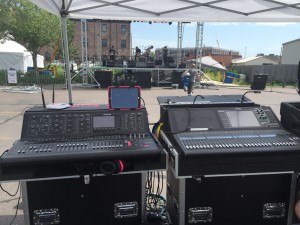 Know your gear in and out. Traveling with a console? Don’t rely on others to tech it for you. With today’s internet and offline editors, you should know your desk inside and out. This way, when it comes to a moment in need of troubleshooting, you aren’t in the dark. Not touring with a console? Contact your local production companies to get some face time behind the most commonly seen boards and gear on the road: Avid consoles, Midas Pro 1’s and 2’s, and Yamaha M7’s.
Know your gear in and out. Traveling with a console? Don’t rely on others to tech it for you. With today’s internet and offline editors, you should know your desk inside and out. This way, when it comes to a moment in need of troubleshooting, you aren’t in the dark. Not touring with a console? Contact your local production companies to get some face time behind the most commonly seen boards and gear on the road: Avid consoles, Midas Pro 1’s and 2’s, and Yamaha M7’s.
Favorite gear?
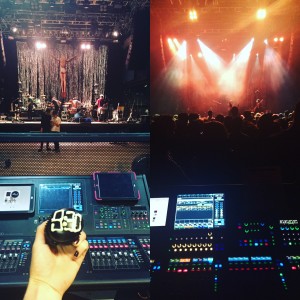 Current favorite is the Roland M5000 console. It is perfect for the size of bands I am touring with from many angles: price, functionality, and tone. The timbre of the board is easy and more transparent than many in its immediate competitive range. The processing gear offered on each channel sounds beautiful and transparent in ideal ways, and the number of options they give without having to have an expansion pack or dongle is amazing. Want D-essers on every channel next to your comp? No problem! Want 10 band parametric EQ’s and 32 band graphic eq’s on all your outputs? EASY! I was able to run monitors from FOH for Hippo Campus by running a double input list so they couldn’t hear my FOH changes in their ears. The board has enough processing power to handle all 32 channels twice no problem, and the functionality shortcuts they built in made it so easy to run my shows this way.
Current favorite is the Roland M5000 console. It is perfect for the size of bands I am touring with from many angles: price, functionality, and tone. The timbre of the board is easy and more transparent than many in its immediate competitive range. The processing gear offered on each channel sounds beautiful and transparent in ideal ways, and the number of options they give without having to have an expansion pack or dongle is amazing. Want D-essers on every channel next to your comp? No problem! Want 10 band parametric EQ’s and 32 band graphic eq’s on all your outputs? EASY! I was able to run monitors from FOH for Hippo Campus by running a double input list so they couldn’t hear my FOH changes in their ears. The board has enough processing power to handle all 32 channels twice no problem, and the functionality shortcuts they built in made it so easy to run my shows this way.

